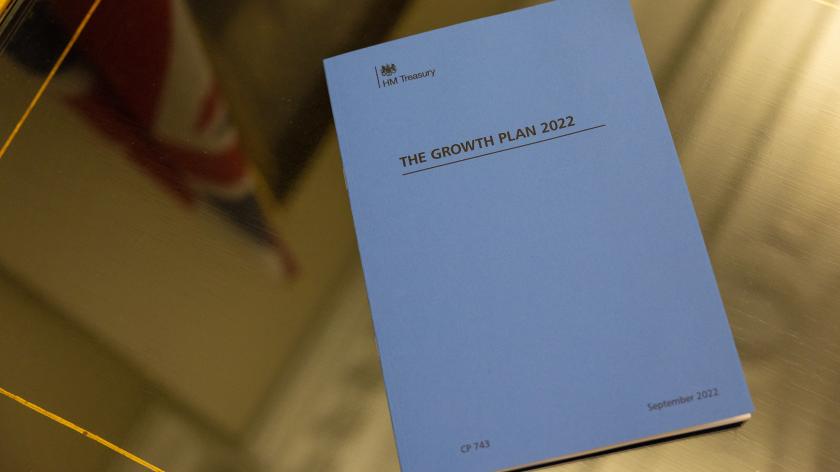Mini-Budget promises to ‘ignite growth’ with lower taxes
by Joanne Birtwistle – Editor in Chief, AccountingWEB
In his first fiscal statement since taking office, Chancellor Kwasi Kwarteng used today’s ‘mini-Budget’ to deliver a package of more than 30 measures he said would tackle high energy bills, drive down inflation and cut taxes to drive growth.
After yesterday’s indication from the Bank of England that the country may already be in recession, the Chancellor focussed his messaging on ‘trickle-down’ economic measures that he said will “drive the country’s economic growth while maintaining responsible public finances.”
There were a few surprises too — not least the repeal of IR35 from 6 April 2023, which means contract workers will once again be responsible for determining their tax and National Insurance contributions.
The Chancellor also announced the closure of the Office of Tax Simplification, the independent body responsible for helping to make the UK tax system simpler and easier to interact with for taxpayers.
On the OTS, Kwasi Kwarteng said: “I’m hugely grateful to the Office of Tax Simplification for everything they have achieved since 2010. But instead of a single arm’s length body which is separate from the Treasury and HMRC, we need to embed tax simplification into the heart of government.”
He added that instead all tax officials will be “mandated to focus on simplifying our tax code”.
The reversal of National Insurance increases was announced in advance, along with increases to dividend tax rates. The Levy was expected to raise approximately £13bn a year, ring-fenced for health and social care spending but the Chancellor said that funding will be maintained.
A cut in the basic rate of income tax to 19p in April 2023, a year earlier than planned, was also announced in a bid to demonstrate support for households, as many struggle with increases in the cost of living. This was coupled with a doubling of the SDLT threshold to £250,000, with the first-time buyers’ threshold raised from £300,000 to £425,000, all effective from today.
Other key announcements were:
- Cancellation of the planned increase in corporation tax — it remains at 19%
- A single higher rate of income tax of 40%, abolishing the 45p rate for those who earn over £150,000 from April 2023
- Planned beer, wine, cider, and spirits duty rate increases cancelled
- The cap on bankers’ bonuses removed
- Sales tax-free shopping for overseas visitors
- Proposed changes to allow pension funds to invest more widely
- A proposal to automatically sunset EU regulations by December 2023.
- The additional rate for savings, dividends and default rates will also be removed from April 2023, and this change will apply UK-wide.
The Chancellor also confirmed the creation of low-tax Investment Zones across 38 local and combined authorities in England – an extension of the 2021 freeports policy – as a means of ‘levelling up’ economic growth. He also talked of liberalising planning rules and new legislation to speed up the delivery of around 100 major infrastructure projects across the UK.
Kwasi Kwarteng said: “Growth is not as high as it needs to be, which has made it harder to pay for public services, requiring taxes to rise. This cycle of stagnation has led to the tax burden being forecast to reach the highest levels since the late 1940s.
“We are determined to break that cycle. We need a new approach for a new era focused on growth.
“That is how we will deliver higher wages, greater opportunities and sufficient revenue to fund our public services, now and into the future. That is how we will compete successfully with dynamic economies around the world.”
Inflation likely to peak at 11%
On Thursday, with the announcement of a further 0.5% interest rate rise to 2.25%, the Bank’s Monetary Policy Committee (MPC) said it expected the UK economy would shrink by 0.1% in this third quarter of the year, after it contracted by 0.1% in the second quarter.
Having previously forecast that inflation would reach 13% in October, the MPC also said that the government’s move to subsidise domestic bills through the Energy Price Guarantee meant inflation would now likely to peak at just under 11%.
ACCA calls for simpler tax system
Reacting to the statement, Glenn Collins, Head of ACCA UK said: “IR35 has desperately needed to be reviewed. The tax system as it stands is overly complex and burdensome for businesses, individuals and public bodies. The reform in April 2021 to IR35 left many businesses without the support they desperately needed due to confusion surrounding the rules and regulations.
“Now more than ever, simplicity is key,” continued Collins. “A simpler tax system avoids the potential for mistakes and enquiries, which too often distracts HMRC from addressing serious and deliberate evasion. However, the dissolution of the Office of Tax Simplification is worrying and will impact UK businesses. The OTS previously worked with holding agencies and provided guidance on previous tax reforms and regulations. Without the OTS and with further details needed on how the government will simplify tax many UK SMEs will still be facing a complicated and unclear tax system.”
Chris Sanger, EY’s head of Tax Policy, said that the departure of the Office of Tax Simplification will leave a hole that the government may struggle to fill. He added: “The government’s aspirations to embed simplification directly into the policy making process of HM Treasury and HM Revenue & Customs is worthy, but without a separate organisation to reinforce this need, there is a risk that simplification will be low on the list of priorities of policy makers.
“During its decade-long life, the OTS has prompted many policy discussions that would otherwise have been difficult to have, including on IR35. Following the abolition, many will be looking to government to continue to engage on the scope for reform, rather than having all such debate within the closed rooms of the Treasury.”
For help and guidance on your businesses taxation matters, contact our experts today.






